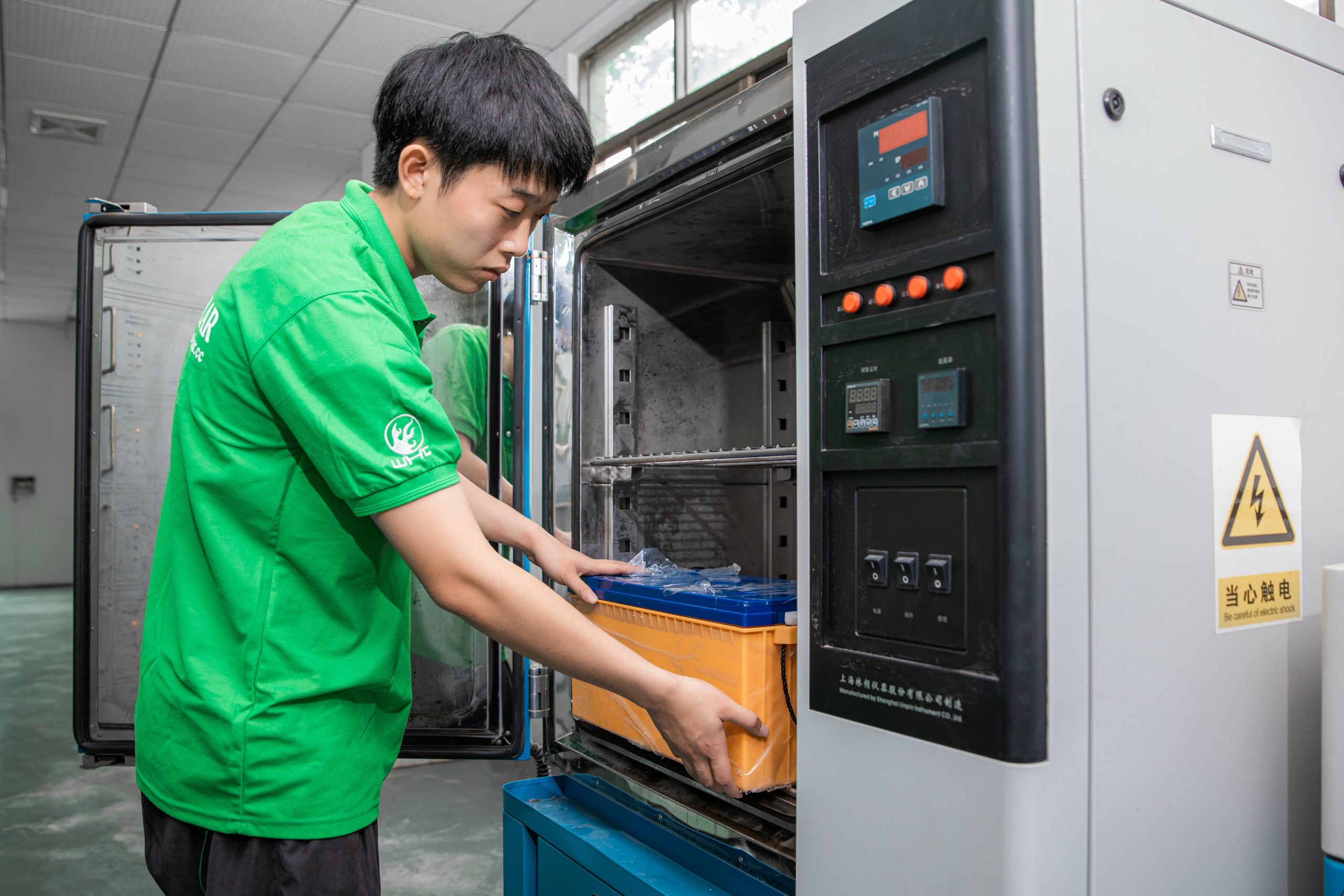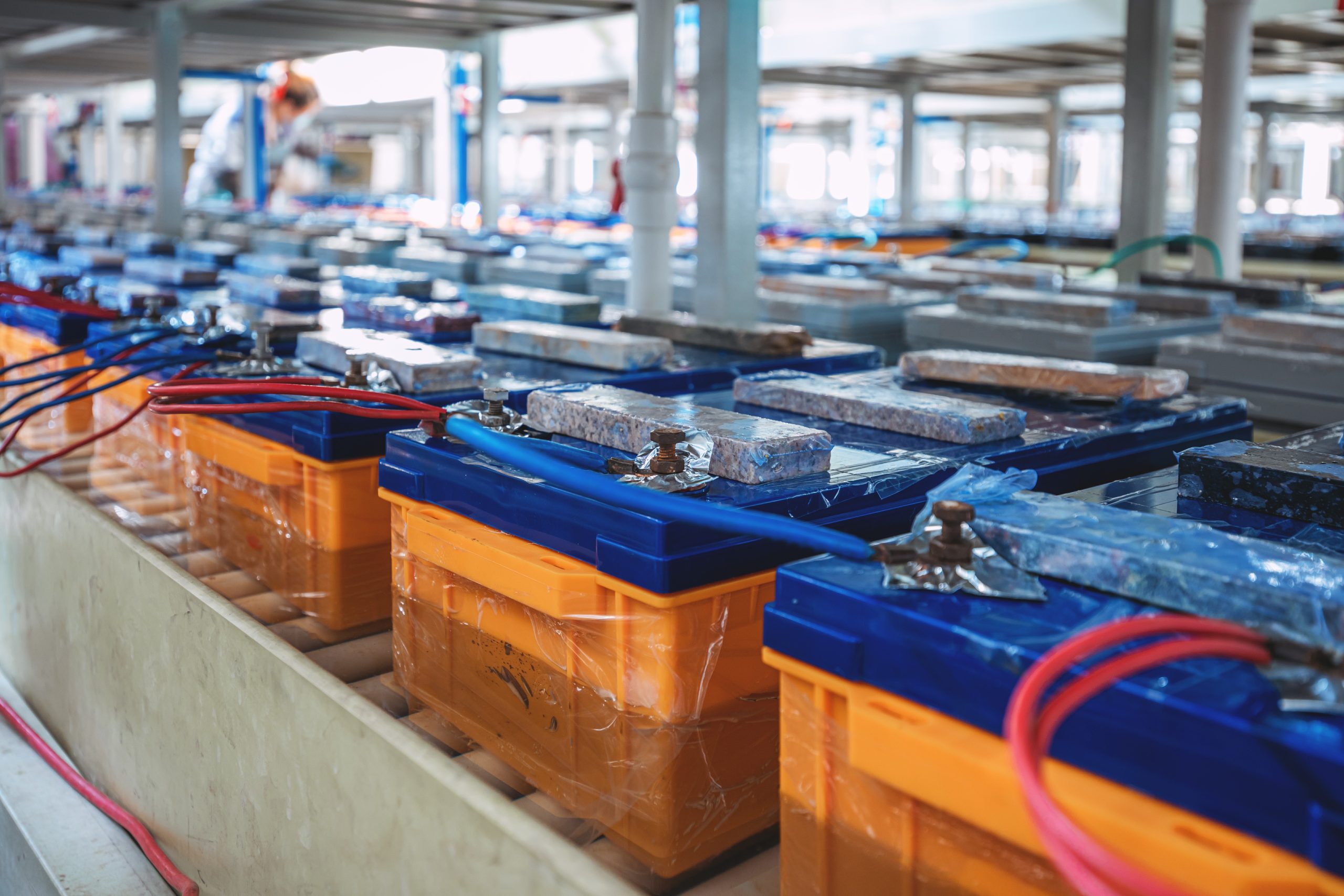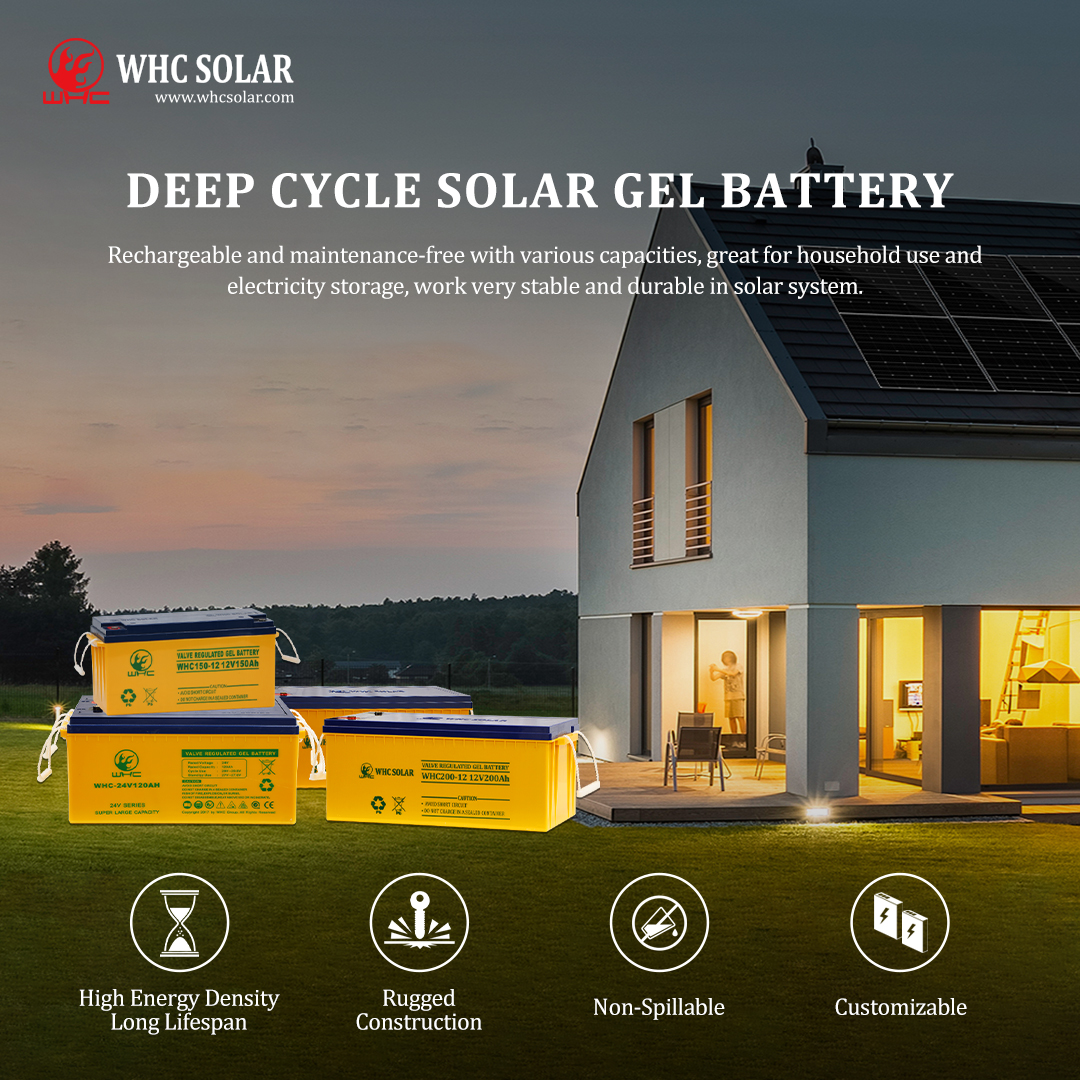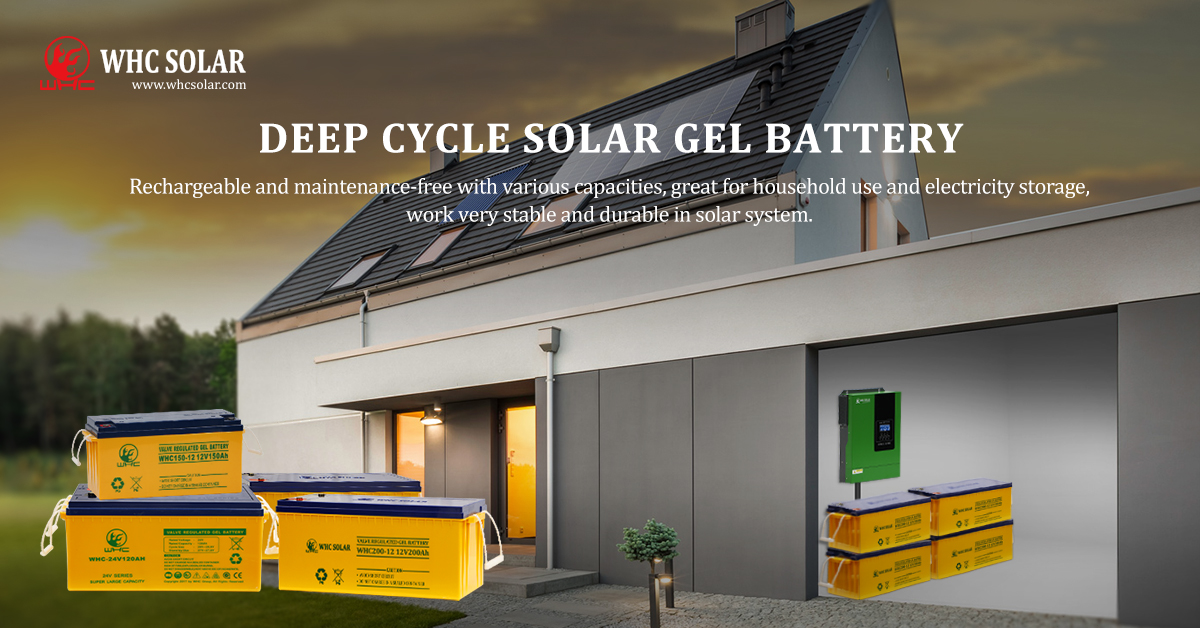Table of Contents
Introduction
Solar power is climbing fast in this race for clean and renewable energy sources. Not only is solar power emerging not just as a clean and renewable resource but becoming one of the leading contenders in the race for our cleaner future as the world moves to sustainable energy solutions. In further pursuit of more efficient notes such as energy storage capacities, innovation within many regards has made impressive advances. They use-a excellent example that harnesses underexposed sun’s energy efficiently. Their material continuously stores light by storing heat generated from motion or light during transportation.

In this piece, we look into solar gel batteries with their benefits and disadvantages, tips to prolong their life span, and how to choose the right one for your solar setup.Also, we will shed light on WHC Solar, a reputed manufacturer and solutions provider in the solar energy industry.
What is a Solar Gel Battery?
A solar gel battery, also referred to as the kind ‘gel’ lead–acid battery, is an invented type of lead–acid battery created solely for solar power storage utilization. While in contrast to the conventional flooded lead–acid batteries, gel batteries use a gelled electrolyte—normally silica gels—which immobilizes the electrolyte so it cannot spill. Improved protection versus vibrations and shocks improve amenity.
Advantages of Solar Gel Batteries
Gel batteries are specifically used in solar power systems. They offer quite a number of advantages when compared to other kinds of batteries. Look at some key advantages associated with the use of solar gel batteries:
Longer cycle life:
The average solar gel battery comes with a longer cycle life as compared to the standard lead-acid battery. Additionally, they can withstand a higher number of charge and discharge cycles before their performance starts degrading significantly. This makes them ideal for renewable energy storage applications like solar power systems.
Deep discharge capability:
The solar gel battery works with deeper discharge levels without sustaining damage. It is designed to be discharged more fully than lead-acid batteries and will allow for greater usable capacity plus overall efficiency in Solar energy storage systems.
Minimal maintenance:
Unlike flooded lead-acid batteries that don’t need much maintenance, solar gel battery doesn’t have to be often topped up with water. The immobilisation of the lead-gel electrolyte inside the batteries ensures there is virtually no risk of leakage and makes using them convenient, especially in remote places or those hard to reach.
Vibration and shock resistance:
The gel electrolyte helps immobilize the internal components of the battery, thus making it more resistant to vibrations and shocks. This characteristic becomes invaluable in mobile applications like marine and RV solar systems.
Enhanced safety:
The solar gel batteries are well-equipped with the safety factor. Due to the special features of a gel electrolyte, it increases the risk of leakage of acid and gas, which makes them safe to handle and less prone to environmental hazards.
Silent Operation:
Gel batteries are totally sealed; therefore, GA gives a quiet and vibration-free operation. This is beneficial in residential or noise-sensitive areas where minimal disturbance is desired.
Wide temperature range:
The solar gel battery can run effectively over a wide temperature range which allows the batteries to withstand high and low temperatures without considerable loss of performance. This way, they may be utilized accordingly in distinctive climates and environments.
Faster charging:
Compared with flooded lead-acid batteries, solar gel batteries charge faster and have a higher charge acceptance rate. This is beneficial for the advancement of solar power systems as they can absorb more energy from the solar panels efficiently.
Environmentally friendly:
Solar gel batteries are considered greener than traditional lead-acid battery because it uses a gel electrolyte that lowers the chance of harmful chemical leaks and emissions.
Battery technology is ever-evolved, so always check with reliable sources and manufacturers to find out what type of battery would work best for your application.

Solar Gel Battery Disadvantages
While solar gel batteries present most of their advantages, they also have some disadvantages that users should consider while evaluating them for a particular application. Here are common disadvantages associated with the use of solar gel batteries:
Higher cost:
Solar gel batteries tend to be more expensive upfront as opposed to traditional flooded lead-acid batteries. The extra manufacturing processes and materials needed in order to develop the gel electrolyte account for most of this cost difference. Still, it’s good to keep in mind that their longer lifespan, along with fewer maintenance needs, may lessen this initial investment over time.
Lower energy density:
As compared to some other battery chemistries like lithium-ion batteries, solar gel batteries generally have lower energy density. This means they require more physical space and weight for the same amount of energy storage, which could be a limiting factor in certain applications.
Sensitive to overcharging:
Although solar gel batteries are designed for deep discharges well, they may be sensitive to excessive or unregulated charging. Overcharging leads to the breakdown of the gel structure and reduces battery performance over time. Careful charge controllers and management systems are required at every stage of battery charging.
High-current capability:
Solar gel batteries might perform less well than flooded lead-acid batteries in high-current applications, such As starting large engines. Alternative battery types might be more suitable if high current output is required.
Charging efficiency:
Although they have a higher charge acceptance rate than flooded lead-acid batteries, solar gel batteries may lose charging efficacy slightly compared to other advanced battery technologies like lithium-ion. In this way, a percentage of the energy generated from the solar panels will be lost during the charging process.
Weight:
Solar gel batteries are heavier than other batteries with similar energy capacity. This weight becomes a concern, especially in applications where weight restriction is essential such as portable solar setups or recreational vehicles.
While they have a wider operating temperature range than flooded lead-acid batteries, solar gel batteries may not perform optimally in extremely high-temperature environments. Elevated temperatures can destroy battery life and overall performance.
Performance in extremely high temperatures:
While they have a wider operating temperature range than flooded lead-acid batteries, solar gel batteries may not perform optimally in extremely high-temperature environments. Elevated temperatures can destroy battery life and overall performance.
Is a gel battery good for solar?
Yes, gel batteries are a good option for solar energy storage in some applications. They are a good option for implementing solar energy storage due to their deep cycle capabilities, low maintenance qualities, vibration resistance, and safety features. They offer reliable energy storage for the solar power system. Besides this, they boast of varying temperatures endurance.

How to Extend Gel Battery Life?
Proper care and maintenance are prerequisites for prolonging the gel battery’s lifespan. Here is a rundown of some tips which may help you in extending the lifespan of your gel battery:
● Charge the Gel batteries:
Don’t charge them more or less than they can handle. Use a charge controller devised for gel batteries to control and regulate the charging process appropriately. Overcharging of gel battery causes the breakdown of the Gel structure responsible for gradually reducing battery performance over time.
● Avoid deep discharges:
Gel batteries can withstand deeper discharges better than flooded lead-acid batteries, but excessive deep discharges shouldn’t be done whenever possible. Repeatedly discharging the gel battery to extremely low levels can cause stress and reduce its lifespan.
● Use compatible equipment:
Make sure that all the components of your solar energy system, the charge controller, and the inverter are compatible with gel batteries. Using an unsuitable piece of equipment can cause improper charging or discharging, leading towards reducing battery life.
● Maintain a suitable temperature:
The gel battery will perform optimally within a specific temperature range. Don’t expose the batteries to extremely high and low temperatures, which may affect their capacity and longevity. If it is possible, then keep them in a cool place where there is good ventilation.
● Prevent sulfation:
Sulfation is common in lead-acid batteries, including gel batteries. Hence, keep the batteries fully charged when not in use for extended periods to prevent sulfation. If the batteries will be idle for an extended time and you want them suitable during that period, consider using a maintenance charger to stay in good condition.
● Regular inspection:
Check the gel batteries every now and then, check if there are any damage or corrosion signs, and check for leaks. If you find something wrong, fix it immediately. Regular maintenance checking can catch problems at an early stage so they don’t get worse.
● Clean the battery:
Keep the battery terminals clean and free from corrosion. Corroded terminals will inhibit current flow and reduce battery performance. Clean the terminals gently with a mixture of baking soda combined with water if required.
● Don’t overload:
Don’t overload the gel batteries by drawing too much power, which they are not able to absorb safely. Knowing how much power your solar energy system requires and making sure that it matches battery capacity will eliminate any damage possible.
● Replace as needed:
Even with proper care, gel batteries will eventually reach the end of their useful life. Check the performance of the battery on a regular basis over time and replace it when it no longer holds a sufficient charge or shows a significant capacity loss.
Following these guidelines will help you keep your gel batteries in proper care and, thus, extend their life while getting the maximum value out of your solar energy storage system. Specific maintenance requirements may vary given manufacturer guidance, so always look up to your battery manufacturer for detailed guidelines on maintaining their gel batteries.

How to select the right solar gel battery?
The correct decision for a solar gel battery implies considering essential elements so that it satisfies their specific need exactly. Here is an exact guide you will have to follow while making your desired choice:
●Determine requirements for energy storage: Calculate your daily energy consumption and the amount of required energy to be stored when there is no sunlight. Knowing your energy storage needs will assist in determining the battery capacity, measured in Ah, needed to satisfy those needs.
●Consider the battery voltage: There are solar gel batteries available in all possible ratings like 12V, 24V or 48V. The requirement for voltage will depend on the set-up of the solar and inverter you wish to use. Ensure that the battery voltage aligns with your system’s specification for voltage.
●Evaluate cycle life: Cycle life refers to the number of charge-discharge cycles a battery can undergo before its capacity degrades significantly. Higher cycle life is preferred as it implies that the battery will last longer. Check out what manufacturer’s specs you should check for the gel battery cycle life you considered acquiring.
●Check the temperature range: Check the temperature condition in your locality. The gel batteries have a wider temperature tolerance as compared to flooded lead-acid batteries, yet extreme temperatures could still lower performance. Choose a Gel battery that operates well within the region’s temperature range.
●Check the manufacturer’s reputation: Look out for reputable manufacturers with a track record in producing high-quality and reliable gel batteries. Read customer reviews, seek recommendations from solar energy system installers or experts, and then make a choice.
●Compare specifications and features: Compare different gel batteries in terms of their capacity, voltage, and cycle life, along with any other relevant features. Choose a battery that matches your energy storage needs and requirements best.
●Think about maintenance requirements: Gel batteries are maintenance-free, but it still pays, in the long run, to know if there are any specific maintenance tasks or precautions recommended by the manufacturer. Look for a battery with minimal maintenance requirements.
●Budget and cost considerations: Gel batteries bring many benefits, but they tend to be generally more expensive upfront than traditional flooded lead-acid batteries. When choosing a gel battery, set a budget and find acceptance between cost and performance.
●Warranty and customer support: Check the warranty offered by the battery manufacturer. Please find out about their customers’ services. A good-quality warranty backed up by reliable customer support can give you peace of mind as well as assistance in case required.
●Ask for advice: If you have doubts about picking up the ideal solar gel battery, get help from a professional solar energy system installer or an expert. He can specify your energy storage requirements and suggest the best-suited battery.
Through careful deliberation of these factors, as well as thorough research, you can select the right solar gel battery that suits your solar energy storage system and provides reliable performance over time.

Why WHC Solar Gel Battery?
Founded in 2009, WHC Solar has made a name for itself as a leading manufacturer and solutions provider in the solar energy industry. With a sprawling processing factory covering 200,000 square meters and a wealth of experience, WHC Solar offers a diverse range of solar products and solutions.
WHC Solar takes pride in its commitment to quality assurance. Each solar battery undergoes strict inspections to guarantee high efficiency and full capacity. As a registered trademark in 37 countries, we stands by our brand, ensuring customers receive genuine and reliable products.

